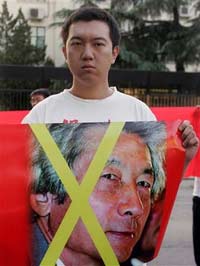|
China commentator urges tougher line against Japan
(Reuters)
Updated: 2006-01-04 09:31
China should prepare for enduring conflict with
Japan and embrace nationalism as a source of social unity, a senior commentator
with the People's Daily wrote against a backdrop of steadily worsening bilateral ties.

A Chinese
protestor holding a banner with a portrait of Japanese Prime Minister Junichiro
Koizumi stands in front of the Japanese embassy during a protest
in Beijing October 17, 2005.
[Reuters] |
The unusually forceful comments in a new
magazine came at a time of renewed sparring between Beijing and Tokyo -- this
time over the suicide of a Japanese diplomat in Shanghai in May 2004.
Japan says the diplomat killed himself after he was blackmailed by Chinese
security agents over a liaison with a prostitute. On Friday, a spokesman for
China's Foreign Ministry, Qin Gang, said Japan was "deliberately vilifying
China's image."
Lin Zhibo, a deputy director of the commentary
department at the People's Daily writes the conflict between the two
countries is about their future status, as well as their past.
"The fundamental conflict between China and Japan now is that China is
rising, and Japan does not want to see China rise. This conflict is long-term
and cannot be altered by the will of the Chinese people," writes Lin.
On Tuesday, the Global Times, a newspaper owned by the People's Daily, said
the new quarrel had "cast a shadow over any improvement and progress in
Chinese-Japanese relations this year."
Lin's comments appeared in a new Chinese journal, China
and World Affairs, issued by Tsinghua University in late 2005.
Lin argues that the conflict between China and Japan is set to deepen. The
two countries' economies are increasingly competing for export markets and
energy supplies, and past Chinese attempts to foster friendship have failed, he
writes.
"Our one-sided efforts for friendship have been totally useless," Lin writes.
"Chinese-Japanese relations will be better handled only if China's stance is
tougher than now."
In April 2005, Chinese cities saw fervent
demonstrations against Japan. More than one million Chinese signed an on-line
petition denouncing Japan's bid for a permanent seat on the U.N. Security
Council.
China especially objects to Japanese Prime Minister
Junichiro Koizumi's repeated visits to the Yasukuni Shrine in Tokyo, where major war
criminals are interred, and has denounced a textbook whitewashing Japan's invasion and
occupation of much of China from 1931 to 1945.
More recently, the two countries have had angry
exchanges over disputed boundaries in the East China Sea and China's military budget
-- which Japan accuses lacks "transparency."
Lin says such friction is sure to continue as China's influence expands.
"China wants to rise. If that's the goal we've settled
on, then we can't be a sheep. We've got to be either a wolf or a
wolf-hunter."
|